Some people enjoy fundraising, perhaps one of your volunteers. It may become important for a formalized advocacy group to raise money for its work. It doesn’t mean you must raise money, or are required to. Many local groups operate through and by members donating services, time and materials.
The costs of copies, travel to events, posters, displays, or tabling supplies shouldn’t fall only on a few people. If you decide to raise money, the work of it shouldn’t fall on one, or the same individual(s) always. Always be on the lookout for volunteers who enjoy fundraising.
Think about the ‘causes’ you’ve donated to, and what circumstances enabled the opportunity to give. Make a list with your fundraising committee, or make it the subject of a meeting. Even if it's a committee of one, make a list of what inspired each of you to give financial support. Discuss and make lists of the events, mailings or appeals that created an opportunity for charitable giving. You may be surprised there are more experiences and ideas than you’ll read about here.
First, we’ll go over some practical matters. Fundraising means some bookkeeping. Your group should appoint at least two people who will be responsible for accounting of income and expenditures -- and at least one responsible for and able to do tax preparation if you formally organize. Even if you won't be required to file formal papers with the IRS, you will want to be accountable to your local membership.

November Coalition Tote Bag
If you don’t formalize, you shouldn’t fundraise as a nonprofit unless under the auspices of a non-profit, and money collected is given to the non-profit entity after the fundraiser. For instance, local people have organized fundraisers and sent the proceeds to the November Coalition for disbursement for the local group's expenses through the year. Other fundraisers have been to support general expenses, like the publication of the Razor Wire to prisoners and for organizing events nationwide.
If your group does educational tabling, don’t forget that a donation jar on the table will prompt people automatically to give.
Here's a few other considerations and ideas for fundraising
Remember that situations sometimes create an opportunity to ask for financial help from those people with considerable extra income. Perhaps your community has seen a rise in drug arrests that seem suspect. If local people have heightened interest, and income to match it, they may support work that requires a project budget to accomplish goals. Established charitable groups might collaborate and serve as fiscal agent, if your group isn’t formalized. If your group chooses this method, be sure to have solid agreements about expectations on both ends, and ask for financial transparency before entering into any agreements or collaborations that include money.
Sometimes an individual will ask your informal group if there is a way to donate. If you have don’t have a formal structure to be able to accept tax deductible gifts don’t or find a 501 (c) 3 organization that will take your project under their wings.
Sales of T-shirts and other products can raise money, but inventories and start-up can be costly. Selling merchandise also leads to tax reporting responsibilities, and unless someone(s) carefully account for inventory, it’s unlikely you’ll raise money. Our office can make small bulk sales to local groups, and giving it an honest try can be worth the effort. Remember though, there are less expensive ways to get a slogan, campaign or website publicized.
If your team consider products, first think about low cost ones like buttons, bumperstickers, postcards, etc. If your group can be responsible for low-cost items, and succeed in goals set out, even if modest ones, then consider expanding your inventory to costlier items. Who knows, you might have enough profit you’ll be able to grow your inventory. Just don’t forget that fundraising for program expenses is your goal! You don’t want to mind a store, and volunteers rarely have storage room to share.

Oh, and don’t forget about the familiar car wash, bake sale (above), raffles and the usual. This is our bake sale table at November's facility. These kinds of fundraising activities are usual for a reason -- they work! Remember, a variety of activities involves different people, and can be lots of fun. Invite a friend not usually involved to join in. People who won’t attend a planning meeting, watch a video series, or go to a demonstration, just might pitch in to work on car wash or bake sale.
Here's a run-down of how a big event can be broken down into small tasks for similar group of volunteers.
Hosting a Benefit
A benefit event can be a fun and educational way to raise funds for your advocacy efforts and spread your message of justice. A benefit can be anything from a simple by-donation movie night with potluck, to a full-fledged, all-night bash with live music, dinner, auctions, and activities for the kids'.
The Coalition is fortunate enough to work in a 4,500 square foot church in the center of town, built in 1924 and renovated in the seventies. We have a ready-made venue (which we filled on two occasions with a live band and well over a hundred folks!), and for your own local needs, see if a local church. community club with facilities for rent, will offer up space to a worthy cause at little or no charge. In 1998, we rented our county fairgrounds and had over 500 people for an all afternoon through evening event with food and music. Weather permitting, an outdoor event, picnic area can also be place where you can gather a group for fun and fundraising.
Our first step was lining up some dedicated assistants. We had a team of four core volunteers for both benefits in 2007, with many others pitching in along the way. At our first meeting we decided party themes, and what activities we’d have to raise money. We contacted a local band, The Planetary Refugees and made sure that our date was an open date for the musicians willing to donate their talents and time. 
One volunteer supervised food donations and assistants for a home-cooked, healthy dinner by donation. Another volunteer organized the auctions, which also entailed finding donations of collectibles and services from local individuals and businesses. Another volunteer planed games for children and adults, and another was in charge of decorations and anything left out -- one of the most important position to have. Every volunteer was involved in getting donations of food, auction items or cash. We are fortunate that artisans in our area our generous to progressive causes of all kinds.
Lots of items we auctioned were handmade or expensive items that people didn't need anymore, from ornate pottery, and jewelry, to a wooden baby cradle. Gift certificates from local stores and homemade cakes and pies -- even a truckload of firewood was donated.
Once time and place were set, auction items coming in, we began to focus on publicizing the event to everyone in the community. We designed and distributed one-sheet flyers, mailed them to local members and put them up in places where people gather. Public service announcements went to our local radio station, and newspapers.
Finally, at every benefit, we set up informational tables, and a little time to remind folks why we gathered in the first place -- because "There is no justice in the war on drugs".